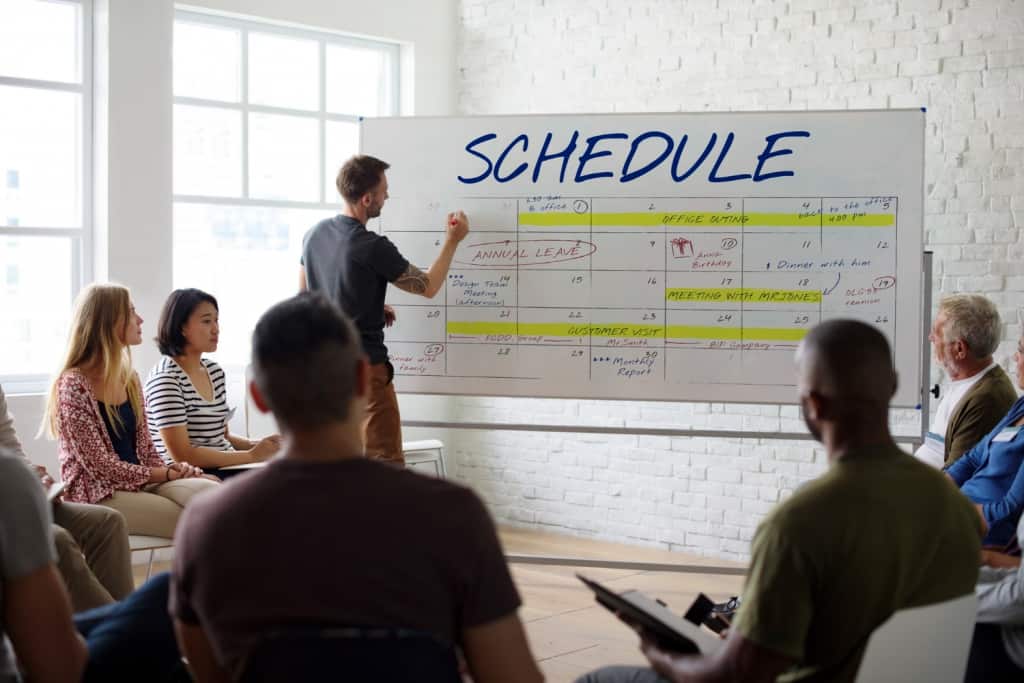Welcome to our beginner's guide to event planning! If you're new to this exciting world and want to kick-start your journey, you're in for a treat! In this blog post, we'll provide essential elements of event planning and guide you through the fundamental steps of planning an event (+free template), from selecting the perfect venue to crafting a budget and coordinating logistics.
Get ready to unlock the door to memorable experiences!
Table of Contents
- Overview
- What Is Event Planning?
- Why Is Event Planning Important?
- Who Is In Charge Of Event Planning?
- What Are The 7 Stages Of Event Planning?
- How To Create A Successful Event Planning
- Free Event Planning Template
- Key Takeaways
- FAQs

Overview
| What are the 5 P's of event planning? | Plan, Partner, Place, Practice, and Permission. |
| What are the 5 C's of an event? | Concept, Coordination, Control, Culmination, and Closeout. |
Tips for Better Engagement
- Everything you need to know about event management
- Types of event
- Business networking

Looking for an interactive way to heat up your event parties?.
Get free templates and quizzes to play for your next gatherings. Sign up for free and take what you want from AhaSlides!
🚀 Grab Free Account
What Is Event Planning?
Organizing and coordinating all the components and tasks required for creating a successful event is known as event planning. It involves careful management of various factors, such as the event's purpose, target audience, budget, logistics, venue selection, vendor coordination, timeline, and overall execution.
For example, you're planning a birthday party for a friend. Event planning phases would involve:
- Decide on the date, time, and location of the party.
- Create a guest list, and send out invitations.
- Choose the theme or style of the party, the decorations, and any specific activities or entertainment you want to include.
- Arrange for food, drinks, and seating arrangements.
- Manage any unexpected issues, and make sure everything goes according to plan.
Why Is Event Planning Important?
Objectives of event planning could be the targets your organization wants to obtain. This would mean that event planning brings order and structure to the process of organizing an event. For instance, carefully planning and coordinating all the necessary elements in advance helps prevent last-minute chaos and ensures everything runs smoothly. Without proper planning, there's a higher risk of disorganization, confusion, and potential mishaps during the event.
- For example, imagine a conference where speakers don't show up, attendees face difficulties finding their way around the venue, and technical issues arise during presentations. Such situations can hinder the event's effectiveness and create a negative participant experience. Effective event planning helps avoid such issues and ensures a seamless and efficient flow of activities.

Who Is In Charge Of Event Planning?
The person or team in charge of event planning depends on the nature and scale of the event. Smaller events may be planned and executed by an individual or a small team, while bigger ones often require a more extensive network of professionals and volunteers to handle the planning process effectively.
Here are a few key roles commonly involved in event planning:
- Event Planner/Coordinator: An event planner or coordinator is a professional who specializes in organizing and managing events. They are responsible for all aspects of event planning, from initial concept development to execution. In addition, they work closely with the client or event stakeholders to ensure the event's objectives are met.
- Event Committee/Organizing Committee: For big events or those organized by organizations or communities, an event committee or organizing committee may be formed. They collaborate to handle various aspects such as marketing and promotion, sponsorship acquisition, program development, logistics, and volunteer coordination.
It's important to note that the level of involvement and the specific roles may vary on the event's size, complexity, and available resources.
What Are The 7 Stages Of Event Planning?

So, what is the event planning process, and how many stages in it? The event planning process typically consists of the following seven stages:
Stage 1: Research and Conceptualization:
Conduct thorough research to understand the event's purpose, target audience, and industry trends. Develop a clear concept for the event, outlining its objectives, theme, and desired outcomes.
Stage 2: Planning and Budgeting:
Create a detailed plan that includes all necessary elements, tasks, and timelines. Develop a comprehensive budget that allocates funds to different aspects of the event.
Stage 3: Venue Selection and Vendor Coordination:
Identify and secure a suitable venue that aligns with the event's requirements and budget. Coordinate with vendors and service providers, such as caterers, audiovisual technicians, decorators, and transportation services, to ensure they can fulfil the event's needs.
Stage 4: Marketing and Promotion:
Marketing and promotion are two of the most important steps in event planning. Develop a strategic marketing and promotion plan to generate awareness and attract attendees. Utilize various channels, including online platforms, social media, email marketing, and traditional advertising, to effectively reach the target audience and communicate the event's value proposition.
Stage 5: Event Execution:
Oversee the logistical aspects of the event, including registration and ticketing, seating arrangements, audiovisual setup, and on-site management. Coordinate with staff, vendors, and volunteers to ensure a smooth flow of activities and address any issues that may arise during the event.
Stage 6: Attendee Engagement and Experience:
Create an engaging and memorable experience for attendees. Plan and organize activities, presentations, entertainment, and networking opportunities that cater to their interests and expectations. Pay attention to details like signage, decorations, and personalized touches to enhance the overall attendee experience.
Stage 7: Post-Event Evaluation and Follow-up:
Evaluate the event's success by collecting feedback from attendees, stakeholders, and team members. Analyze the event's outcomes against the established objectives and review the financial aspects.
Identify areas of improvement and capture lessons learned to refine future event planning processes. Additionally, follow up with attendees, sponsors, and partners to express gratitude and maintain relationships.

How To Create A Successful Event Planning
While there isn't a universally agreed-upon set of elements for event planning, here are key elements that are often considered essential for effective event planning:
1/ Clear Objectives:
Establish the goals and objectives of the event. Understand what you want to achieve and align all planning efforts accordingly whether it's raising funds, fostering networking, promoting a product, or celebrating a milestone.
2/ Budget Management:
Develop a realistic budget and allocate funds to different aspects of the event, including venue, catering, decorations, marketing, and logistics.
Regularly track expenses and ensure you stay within budget. Allocate funds strategically to achieve the desired outcomes while prioritizing cost-effective options.
3/ Strategic Planning and Timeline:
Create a comprehensive plan that outlines all tasks, responsibilities, and deadlines. Break down the planning process into manageable steps, from initial concept development to post-event evaluations.
A detailed timeline ensures smooth coordination and allows for adjustments as needed.
4/ Event Design and Theming:
Create a cohesive and engaging event design that reflects the desired atmosphere or theme. This includes elements such as decorations, signage, lighting, and overall aesthetics that contribute to the event's ambiance.
5/ Logistics and Operations:
Pay close attention to logistical details, including event registration, ticketing, transportation, parking, audiovisual requirements, and on-site management. Ensure smooth operations by effectively coordinating all necessary resources.
6/ Evaluation and Feedback:
Assess the success of the event by gathering feedback and evaluating its impact.
Analyze attendee satisfaction, measure outcomes against the established objectives, and identify areas for improvement in future events.
Free Event Planning Template
Here's an event planning template that incorporates the seven stages of event planning:
| Stage | Tasks | Responsible Party | Deadline |
| Research and Conceptualization | Define event purpose, objectives, and theme | ||
| Conduct market research and analyze industry trends | |||
| Develop event concepts and outline key messaging | |||
| Planning and Budgeting | Create a detailed event plan with tasks and timelines | ||
| Allocate budget for venue, catering, marketing, etc. | |||
| Track expenses and review the budget regularly | |||
| Venue Selection and Vendor Coordination | Research and identify potential venues | ||
| Contact and negotiate with vendors and suppliers | |||
| Finalize contracts and coordinate logistics | |||
| Marketing and Promotion | Develop marketing strategy and target audience | ||
| Utilize online platforms, social media, and advertising | |||
| Create promotional content and materials | |||
| Event Execution | Manage event logistics, registration, and ticketing | ||
| Coordinate staff, volunteers, and vendors | |||
| Oversee on-site activities and guest experience | |||
| Attendee Engagement and Experience | Plan engaging activities, presentations, and networking | ||
| Design event layout, signage, and decorations | |||
| Personalize attendee experiences and details | |||
| Post-Event Evaluation and Follow-up | Collect feedback from attendees and stakeholders. | ||
| Analyze event outcomes and assess attendee satisfaction. | |||
| Identify areas for improvement and lessons learned. | |||
| Express gratitude and follow up with attendees and partners. |
Key Takeaways
Event planning is a dynamic process that requires thorough research, strategic planning, and flawless execution to achieve successful and unforgettable events. Whether it's a corporate conference, wedding, or community gathering, effective event planning ensures the attainment of goals, active engagement of attendees, and the delivery of a positive experience.
Moreover, AhaSlides can help you create unique events with interactive features. From engaging presentations to real-time audience interaction, AhaSlides offers a range of tools that can elevate your event to new heights. Explore our library of ready-made templates now and witness the excitement of your attendees soar!
Frequently Asked Questions
What does event planning mean?
Event planning means organizing and coordinating all the components and tasks required for creating a successful event. It involves managing various factors, such as the event's purpose, target audience, budget, logistics, venue selection, vendor coordination, timeline, and overall execution.
What are the seven stages of event planning?
(1) Research and Conceptualization (2) Planning and Budgeting (3) Venue Selection and Vendor Coordination (4) Marketing and Promotion (5) Event Execution (6) Attendee Engagement and Experience (7) Post-Event Evaluation and Follow-up
What are the six elements of effective event planning?
Critical elements of effective event planning include: (1) Clear Objectives: Establish event goals and align planning efforts accordingly. (2) Budget Management: Develop a realistic budget and allocate funds strategically. (3) Strategic Planning and Timeline: Create a comprehensive plan with tasks and deadlines. (4) Event Design and Theming: Create a cohesive and engaging event design. (5) Logistics and Operations: Pay attention to logistical details and coordinate resources and (6) Evaluation and Feedback: Gather feedback to assess event success and identify areas for improvement | These elements help ensure effective event planning, but customization based on specific event needs is essential.
Ref: Wild Apricot | Project Manager








